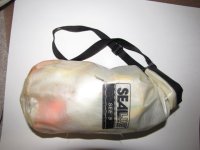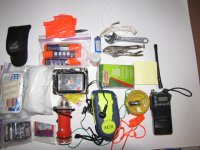Barry Rietz
New member
Personal EPIRB
Handheld VHF Radio
Handheld GPS
Spare Batteries
Whistle
Mirror
Light jacket
Foul weather clothes
Hat
Bandana
Space blanket
Laser light
Flashlight on lanyard
Chemical Lights
Headlamp
Strobe light
Line, different sizes
Bungees
Fishing Kit
Dive mask
Pole spear gun
Fire starter
Compass
Watch
Sun glasses
Reading glasses
Sunscreen nose guard
Sunscreen
Insect repellent
Toothbrush
Small First aid Kit
Duct tape
Rescue tape
Large survival knife
Leatherman
Swiss army knife
Knife sharpener
Permanent marker pen
Waterproof paper / pen
Copy of passport
HandiWipes
Personal medication
Zip ties
Zip lock bags
Money
Food
Power bars
Water
Water Bag
Hand pump water maker
Handheld VHF Radio
Handheld GPS
Spare Batteries
Whistle
Mirror
Light jacket
Foul weather clothes
Hat
Bandana
Space blanket
Laser light
Flashlight on lanyard
Chemical Lights
Headlamp
Strobe light
Line, different sizes
Bungees
Fishing Kit
Dive mask
Pole spear gun
Fire starter
Compass
Watch
Sun glasses
Reading glasses
Sunscreen nose guard
Sunscreen
Insect repellent
Toothbrush
Small First aid Kit
Duct tape
Rescue tape
Large survival knife
Leatherman
Swiss army knife
Knife sharpener
Permanent marker pen
Waterproof paper / pen
Copy of passport
HandiWipes
Personal medication
Zip ties
Zip lock bags
Money
Food
Power bars
Water
Water Bag
Hand pump water maker



